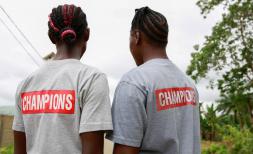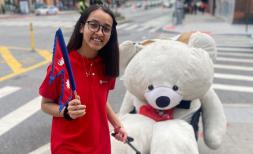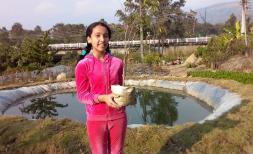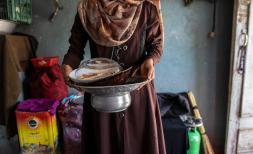Albania’s “Children Stand Up” for Climate Action
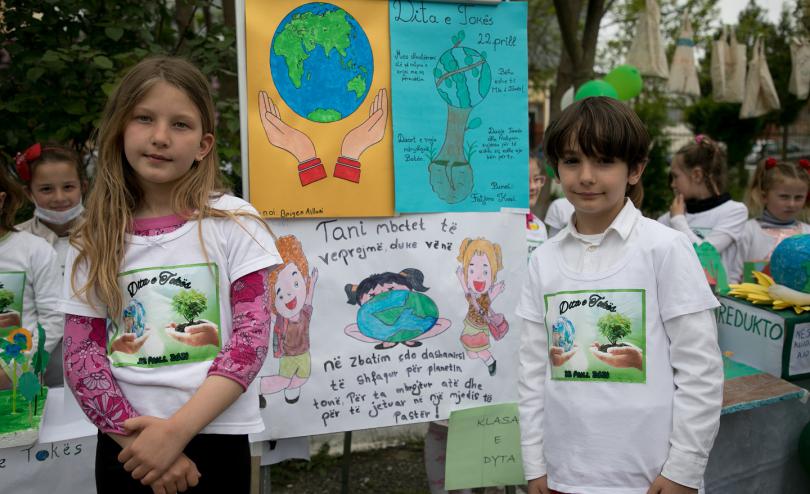
Yesterday, the latest Intergovernmental Panel on Climate Change (IPCC) Report, highlighted that the unprecedented changes observed in the climate are already set in motion, leading to extreme weather events and continued sea level rise.[1]
We work to empower children's voices, including those who are disproportionately affected by the climate crisis. We do this by supporting children to be a part of the solution, engage in leadership in the climate movement, and to influence decisions made by world and local leaders. In the long-term, children and youth will become adults who actively care about nature, act on climate change and advocate about issues that will impact the social and economic issues of their generation.
“The planet, lakes and seas have become very dirty. Our hands can change everything! Small actions can transform the world!” Raja*, 11 years old from Elbasan, Albania.
In the picture above, the children are holding a banner that translates to: "Earth belongs to children and children are the future of this planet"
Children are leading the way in the fight for climate action and children in Albania are taking action!
The “Children Stand Up” programme aims to develop a primary and secondary curriculum, with the support of environmental activists and specialists, targeting children and young people. The programme runs in Albania and Italy, where it is supported by Save the Children Italy’s partner, the OIKOS Institute. Eventually, the project aspires to raise the awareness of teachers, students, civil society, and local government officials, in addition to engaging schools in climate-friendly initiatives such as planting trees.
“Addressing the rights of children to a healthy environment is becoming a critical issue at this time. Based on our previous experience, we have found it useful to begin the process by engaging local stakeholders and children at the sub-national level in conversations about needs and possible interventions. Seeking input from local communities at an early stage is critical to understanding how the legal framework and the action plans/strategies at country level can improve children’s rights to a healthy environment. While there could be different forms of such outreach, conducting a series of dialogues—sometimes calling national, local, or stakeholder dialogues—can be an excellent way to begin this process.” Edlira Ngjeci, the Programme Implementation Manager.
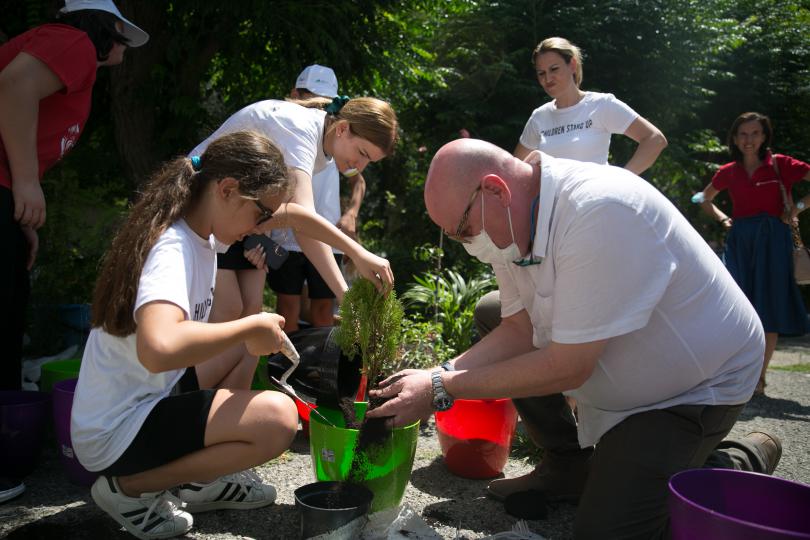
Through the programme, children are hosting discussions at school and at the local level on the importance of including climate friendly measures in institutional planning and ensuring children are engaged in climate change decision-making. Another part of the project’s approach is a children’s radio station called “Underadio”. This is a web-radio platform led by children through which they can reach and raise the awareness of children in other areas not directly targeted by the project; ensuring children are able to speak up and campaign on climate issues.
Children are also taking part in climate advocacy, working with Save the Children to submit their recommendations in an alternative report to the UN Committee on the Rights of the Child – the first time climate change issues have ever been addressed in such a report in Albania! The Committee, part of the UN Convention of the Rights of the Child which protects all children’s rights, has issueda new General Comment on Children’s Rights and the Environment. This will provide guidance to the 196 countries who have ratified the UNCRC, and as a tool for children and young people to hold governments to account on their right to a healthy environment and protected climate.[2]
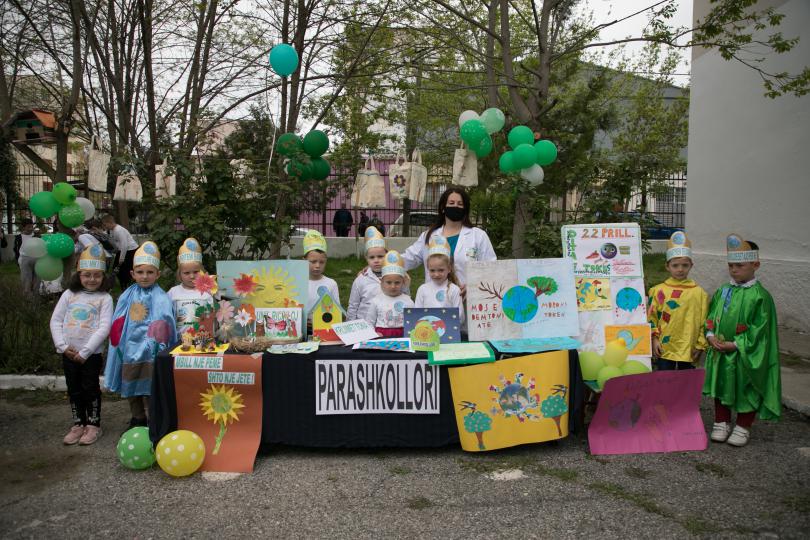
Save the Children’s Middle East and Eastern Europe Director Jeremy Stoner, visited one of the schools taking part in the programme earlier this month and was impressed by what he saw. “We have provided 20 schools with air quality monitoring devices which are set up in each of the schools and where the children are taught to collect the data and analyze it. With this data the children can report on the quality of air in the school neighborhood by answering questions like: Where are the high levels of CO2 coming from? They are even using this data with the municipality to ensure that high levels of pollutants are tackled through integrating pollution control into municipal policies and plans… having talked to Save the Children staff, teachers and children, this has the potential to change the game through education and children driving advocacy to tackle climate change in Albania,”.

In April 2021, Save the Children reported that approximately 710 million children live in the 45 countries that are at the highest risk of suffering the impact of climate change.[3] Often,the impacts of the climate crisis push children and families already living in poverty, hunger or conflict further into poverty and they can be forced to seek better living conditions far from home. Eastern Europe has been no exception. Last month, record high temperatures were recorded across Bosnia, Ukraine and Serbia. Exceptional heatwaves are becoming more severe and more frequent due to the climate crisis and are now the leading cause of weather-related fatalities in most of Europe and Asia.[4]
In the long-term, Save the Children’s ambition is to ensure that children are able to act on climate change and advocate about issues that will advance the social and economic issues that they care about and of their generation. The climate crisis directly affects children around the world and is the greatest threat to their survival, learning and protection. Without addressing the climate crisis, today's children will bear the greatest burden. The climate crisis will increase existing inequalities for already marginalised children with girls, children with disabilities, children living in poverty, refugee, migrant and displaced children will be affected first and worst by the climate crisis. .
As adults and decision-makers, we have the power to impact children’s lives today and tomorrow. We must listen and take action to ensure children have a seat at the table.
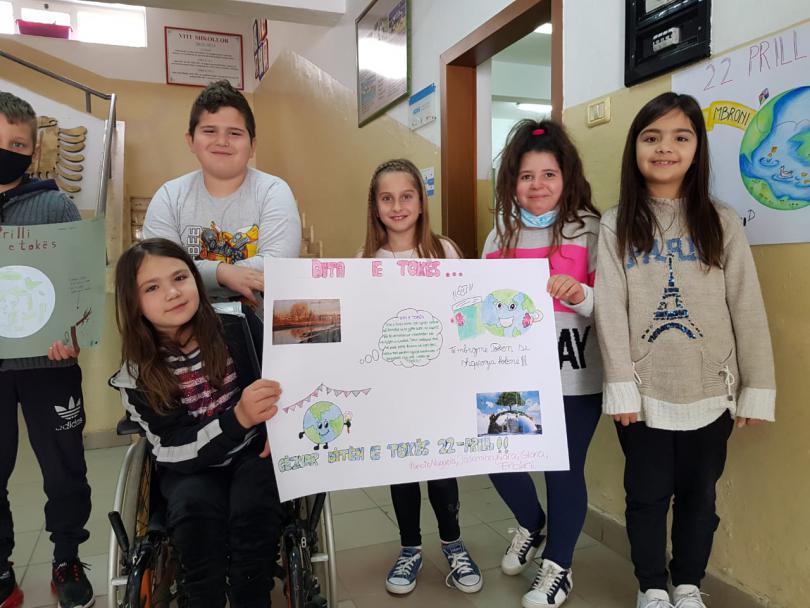
[1] Climate change widespread, rapid, and intensifying – IPCC Press Release https://www.ipcc.ch/site/assets/uploads/2021/08/IPCC_WGI-AR6-Press-Release_en.pdf
[2] OHCHR, The UN Committee on the Rights of the Child commits to a new General Comment, 2021. Available from: https://www.ohchr.org/EN/NewsEvents/Pages/DisplayNews.aspx?NewsID=27139&LangID=E
